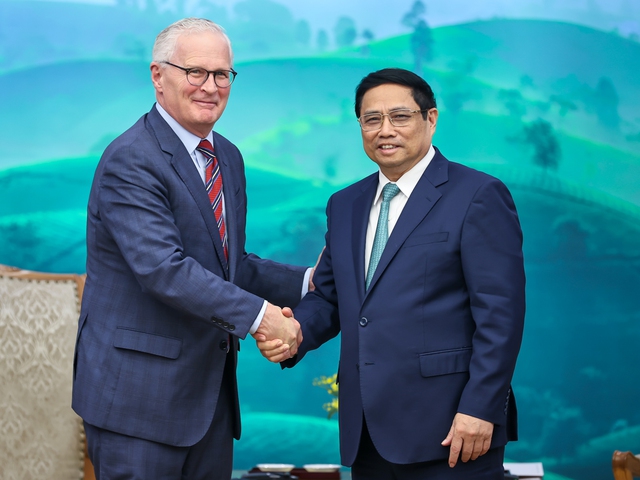Vietnam emerges as most attractive destination for US semi-conductor investors
The US is experiencing a shortage of semiconductor talent, and since the outbreak of Covid-19, Vietnamese human resources have played a crucial role in alleviating this deficit.
The US semiconductor industry finds Vietnam to be its most appealing investment destination, and the country can serve as a strategic partner in supplying skilled human resources.
| Prime Minister Pham Minh Chinh and SIA President John Neuffer. Photos: Nhat Bac |
John Neuffer, President and CEO of the Semiconductor Industry Association (SIA), underscored this perspective during a meeting with Prime Minister Pham Minh Chinh on December 7. The meeting was attended by executives from major US semiconductor manufacturers, including Intel, Qualcomm, Ampere, and ARM.
The US is experiencing a shortage of semiconductor talent, and since the outbreak of Covid-19, Vietnamese human resources have played a critical role in alleviating this deficit, according to Neffeur.
He added that the SIA has recognized Vietnam's remarkable progress in the semiconductor sector, positioning the country as a significant player in the semiconductor supply chain.
At the meeting, Prime Minister Chinh highlighted Vietnam's ongoing efforts to formulate a strategy for human resource development, coupled with appropriate incentives to attract businesses involved in the production, design, and development of cutting-edge semiconductor chip products from overseas.
Currently, Vietnam boasts around 6,000 engineers contributing to the semiconductor industry for both domestic and international enterprises.
“With a target set for 2030, Vietnam aims to train 50,000 high-quality engineers, with a specific focus on training semiconductor circuit design engineers,” Chinh noted.
| Overview of the meeting. |
Within the framework of the newly established Comprehensive Strategic Partnership, both Vietnam and the US have agreed to prioritize science, technology, and innovation as key pillars of the bilateral relationship. Chinh stressed the need to focus resources on key areas, particularly the semiconductor industry.
Both the Prime Minister and SIA President recognized the immense potential for cooperation in this sector.
In this regard, the Ministry of Planning and Investment will oversee and coordinate specific collaborations with the SIA.
Chinh also urged the SIA to mobilize the US Government to promptly recognize Vietnam's market economy status and remove unnecessary controls on technology transfer, human resource training, and laboratory construction. This support would enable Vietnamese businesses to actively participate in the global semiconductor supply chain in the US, said Chinh.
The President of the SIA also expressed that US enterprises are eagerly awaiting Vietnam's national semiconductor strategy. They hope that Vietnam will assume a more important role in the global supply chain, quickly capitalizing on new advantages and opportunities, particularly in chip design, which requires less investment compared to production. At an earlier meeting in September between the Prime Minister and the President of the SIA, as well as senior leaders of US semiconductor businesses, both parties agreed to promote visits and exploration by US semiconductor delegations to invest in Vietnam. They also committed to supporting the connection of businesses between the two countries.
Founded in 1977, the SIA is the association representing the US semiconductor industry—a leading export sector and a critical driver of economic strength, national security, and global competitiveness for the US. Today, the SIA brings together a network of member businesses responsible for 99% of the US semiconductor industry's revenue, with over 65% being foreign businesses.














